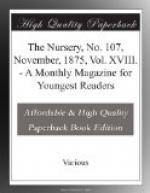In Canton, there are many more boats than here; for the floating population there is the largest in the world. I have seen as many as ten children in one boat. The small ones have ropes tied around them: so, if they fall into the water, they can be picked up easily.
A little fire in a small earthen vessel is all that these strange people have to cook their food by. The poorer ones have nothing but rice to eat, and consider themselves very fortunate if they get plenty of that. Those better off have a great variety of food; and some of it looks quite tempting; but the greater part is horrible to look at, and much worse to smell.
All the men and boys have their hair braided in long cues. The women have theirs done up in various styles; each province in China having its own fashion. Neither women nor men can dress their own hair. The poorest beggars in the street have their hair done up by a barber.
For the men there are street barbers, who shave heads on low seats by the roadside; but, for the higher classes and the women, a barber goes to their houses. The women’s hair is made very stiff and shiny by a paste prepared from a wood which resembles the slippery-elm. It takes at least an hour to do up a Chinese woman’s hair.
C.E.C.
HONG KONG, CHINA.
MINOS.
I read, the other day, an account, taken from an English paper, of a wonderful little dog, called Minos. He knows more arithmetic than many children. At an exhibition given of him by his mistress, he picked out from a set of numbered cards any figure which the company chose to call for. When six was called, for instance, he would bring it; and then, if some one said, “Tell him to add twelve to it.”—“Add twelve, Minos,” said his mistress. Minos looked at her, trotted over to the cards, and brought the one with eighteen on it.
Only once was he puzzled. A gentleman in the audience called out, “Tell him to give the half of twenty-seven.” Poor Minos looked quite bewildered for a moment; but he was not to be baffled so. He ran off, and brought back the card with the figure on it. Was not that clever?
He has photographs of famous persons, all of which he knows by name, and will bring any one of them when told to. He can spell too; for when a French lady in the company wrote the word “esprit,” and handed it to him, he first looked at it very hard, and then brought the letters, one by one, and placed them in the right order.
When Minos was born, he was very sickly and feeble; and his mother would not take care of him, and even tried to kill him. But little Marie Slager, daughter of the lady who has him now, took him and brought him up herself.
[Illustration]
From that time he was her doll, her playfellow, her baby. She treated him so much like a child, that he really seemed to understand all that was said to him. She even taught him to play a little tune on the piano.




